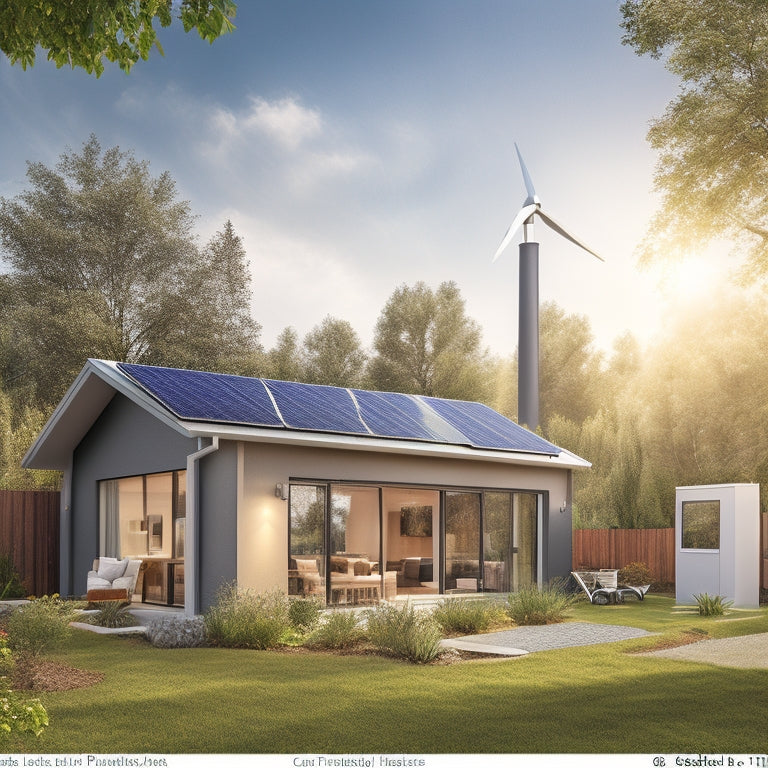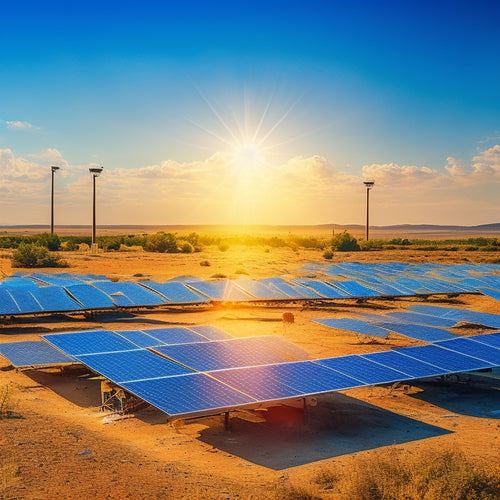
7 Essential Tips for Affordable Home Energy Systems
Share
You want to design an affordable home energy system that meets your unique energy needs and maximizes your savings. First, assess your energy needs and consumption patterns to determine the right system size. Then, choose the right solar panels and energy storage options, considering panel efficiency, durability, and energy conversion rates. Optimize your roof's solar potential by strategically placing panels and conducting shading analysis. Select a reliable inverter system, monitor and maintain its performance, and look for incentives and rebates. By following these essential tips, you'll be well on your way to achieving an affordable, efficient, and sustainable home energy system - and that's just the beginning of your energy-saving journey.
Key Takeaways
• Conduct an energy audit to identify high consumption areas and optimize energy usage in your home.
• Assess energy needs to determine the right system size and choose high-quality solar panels with advanced technology.
• Strategically place solar panels on your roof to maximize sunlight capture, considering tilt angle, orientation, and shading analysis.
• Ensure inverter system reliability and seamless integration with energy storage and monitoring for consistent energy conversion.
• Research and utilize government and utility company incentives, including the Residential Renewable Energy Tax Credit, to make your system more affordable.
Assess Your Energy Needs First
Before investing in a home energy system, you must ascertain how much energy your household consumes to guarantee you're getting a system that meets your specific needs. Conducting an energy audit is important to determine your household consumption patterns. This involves tracking your energy usage over a certain period, usually a year, to identify areas of high energy consumption. You can do this by reviewing your past utility bills or using a smart plug to monitor your energy usage in real-time.
An energy audit will help you identify the most energy-intensive appliances and areas in your home. This information is essential in determining the size and type of energy system you need. For instance, if you have a large family or multiple electrical appliances, you may require a more extensive energy system to meet your energy demands.
Choose the Right Solar Panel
When choosing the right solar panel for your home energy system, you'll want to take into account a few key factors.
First, you'll need to assess your energy needs to determine the size of the system you require.
From there, you'll want to evaluate panel efficiency and inspect durability ratings to make sure you're getting the best value for your investment.
Assess Your Energy Needs
Accurately evaluating your energy consumption patterns is essential for determining the size and type of solar panel system you require. To do this, you'll need to conduct an energy audit, which involves tracking your energy usage over a period of time.
Start by monitoring your daily habits, such as the number of hours you use lights, appliances, and electronics. You can also install home automation devices to track your energy usage in real-time. This will give you a clear picture of your energy consumption patterns, helping you identify areas where you can cut back.
For instance, you may find that you're using more energy than you thought on certain appliances or lighting. By identifying these areas, you can adjust your daily habits to reduce your energy usage and optimize your solar panel system.
Evaluate Panel Efficiency
You'll need to take into account the efficiency of different solar panels to make sure you're getting the most out of your system, as even a slight improvement in efficiency can greatly impact your energy output. When evaluating panel efficiency, focus on the energy conversion rate, which is the percentage of sunlight converted into usable energy.
Look for high-efficiency panels with a rate above 20%. These panels may be more expensive, but they'll generate more power per hour of sunlight.
Panel quality also plays a significant role in energy conversion. High-quality panels with advanced technology can convert more sunlight into energy, increasing your overall energy output. Additionally, consider the temperature coefficient, which affects the panel's performance in high temperatures. A lower temperature coefficient means the panel will perform better in hot conditions.
Inspect Durability Ratings
Now that you've considered panel efficiency, it's time to examine the durability ratings of your potential solar panels, as a robust system can withstand various environmental conditions and maintain its performance over time.
When evaluating durability, you'll want to take into account weather resistance and material quality. A high-quality solar panel should be able to withstand extreme temperatures, humidity, and weather conditions.
Here's a breakdown of what to look for in a durable solar panel:
| Feature | Description |
|---|---|
| Weather Resistance | Ability to withstand extreme temperatures, humidity, and weather conditions |
| Material Quality | High-quality materials used in the panel's construction |
| Frame Durability | Robust frame design to withstand wind, snow, and other environmental stressors |
| Certification | Look for certifications like UL and IEC, which guarantee the panel meets industry standards |
Consider Energy Storage Options
As you explore ways to optimize your home energy system, incorporating energy storage options can greatly enhance your ability to efficiently utilize generated power and reduce reliance on the grid. When considering energy storage, it's important to prioritize battery safety to avoid potential risks. Look for batteries with built-in safety features, such as thermal management systems, to guarantee reliable operation.
When selecting an energy storage system, consider the grid connection type. Will you opt for a grid-tied system, which feeds excess energy back into the grid, or an off-grid system, which operates independently? Energy density is another key factor, as it affects the system's overall efficiency. A higher energy density means more power in a smaller package.
Additionally, consider the cycle life of the batteries, which impacts their overall lifespan. A longer cycle life translates to reduced replacement costs and minimized waste. In the event of a power outage, a reliable energy storage system can provide backup power, ensuring your home remains operational.
Optimize Your Roof's Solar Potential
When maximizing your roof's solar potential, you'll want to take into account two critical factors: solar panel placement and roof orientation. By carefully positioning your solar panels, you can optimize energy production and minimize energy losses.
Solar Panel Placement
You can maximize your roof's solar potential by strategically placing solar panels to capture the most sunlight throughout the day. A well-planned solar panel placement guarantees the best energy production and reduces the risk of energy losses. To achieve this, conducting a shading analysis is crucial to identify areas where trees, buildings, or other obstructions may cast a shadow on your solar panels.
| Obstruction Type | Impact on Solar Panels |
|---|---|
| Trees | Reduces energy production by 10-20% |
| Buildings | Blocks direct sunlight, reducing energy production by 30-40% |
| Vent Pipes | Partial shading, reducing energy production by 5-10% |
Roof Orientation Matters
Optimizing your roof's solar potential begins with understanding how its orientation affects energy production, since a south-facing roof receives the most sunlight throughout the day. You'll want to guarantee your roof is designed with solar energy production in mind.
A well-designed roof architecture can greatly impact your energy output. For instance, a roof with a southern orientation can boost energy production by up to 20% compared to a roof with an eastern or western orientation.
When it comes to roof orientation, you should also consider the angle of your solar panels. A tilt angle between 30° and 40° is ideal for maximizing energy production.
Additionally, incorporating solar windows into your roof design can help enhance energy production while also providing natural light and reducing the need for artificial lighting.
Select a Reliable Inverter System
Ensuring the dependability of your inverter system is vital to harnessing consistent and efficient energy from your renewable sources. A reliable inverter system ensures that the energy generated from your solar panels or wind turbines is converted efficiently into usable electricity for your home.
When selecting an inverter system, you should prioritize system integration. Look for inverters that seamlessly integrate with your energy storage systems, grid connections, and monitoring systems. This will guarantee a smooth and efficient flow of energy throughout your home.
Regular inverter maintenance is also essential to prevent system downtime and optimize energy production. You should choose an inverter system with a proven track record of reliability and minimal maintenance requirements. Additionally, consider inverters with built-in monitoring capabilities, which can alert you to potential issues before they become major problems.
Monitor and Maintain Performance
With a reliable inverter system in place, it's now important to regularly monitor and analyze its performance to identify areas for improvement and prevent potential issues. You'll want to keep a close eye on your system's data tracking to make sure it's operating within ideal parameters. This will help you pinpoint any inefficiencies and make adjustments to maximize energy production.
Regular system checks are also essential to maintaining peak performance. Schedule routine inspections to identify and address any potential issues before they become major problems. This includes checking for dust and debris buildup, verifying proper wiring connections, and ensuring that all components are functioning as intended.
Look for Incentives and Rebates
Take advantage of government and utility company incentives, which can greatly reduce the upfront cost of your home energy system, by researching and applying for rebates and tax credits that you're eligible for.
You can start by checking the Database of State Incentives for Renewables & Efficiency (DSIRE) or the U.S. Department of Energy's website for federal and state-specific incentives. Government Grants, such as the Residential Renewable Energy Tax Credit, can provide a substantial portion of the total cost of your system.
Additionally, many utility companies offer rebates for energy-efficient upgrades, so be sure to check with your provider. You can also consult with a tax professional to make sure you're taking advantage of all eligible tax credits.
Frequently Asked Questions
Can I Install a Solar Panel System Myself to Save Money?
'You're considering installing a solar panel system yourself to save money, but be aware of DIY challenges like managing electrical connections and ensuring structural integrity, and prioritize safety considerations, like avoiding roof falls and electrical shocks.'
How Long Does It Take to Pay off the Cost of a Solar Panel System?
"Your solar panel system is like a seed you've planted, and it takes time to grow and flourish. With system financing, you'll break even in 5-7 years, thanks to energy savings, and then reap the benefits of free energy for years to come."
Are Energy-Efficient Appliances Necessary for an Energy-Efficient Home?
When building an energy-efficient home, you'll want to prioritize appliances meeting strict Appliance Standards, look for Energy Labels like ENERGY STAR, and consider smart home devices to optimize your energy usage, making your home a sustainable haven.
Can I Add Solar Panels to My Existing Roof Without Replacing It?
As you envision a radiant sun symbolizing renewable energy, you wonder if your existing roof can support solar panels. Before installation, inspect your roof's condition, ensuring its structural integrity can handle the added weight and stress.
Do Solar Panels Work Efficiently During Winter or on Cloudy Days?
You'll be glad to know that solar panels still work efficiently during winter, albeit at a reduced capacity, and can generate some power on cloudy days, although winter performance is typically 10-20% lower due to shorter days and cloudy conditions.
Related Posts
-

Is This the Future of Alternative Energy Systems
Yes, alternative energy systems are shaping the future of energy. Innovations in solar and wind technologies are driv...
-

What Happens Without a Charge Controller in Solar Panels
Without a charge controller in your solar panel system, you risk overheating batteries due to overcharging, which can...
-

Top Camping Water Bottles for Adventure
When you're out adventuring, picking the right camping water bottle is essential for staying hydrated. Look for durab...


